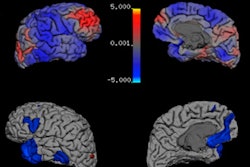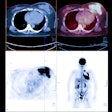Dear Molecular Imaging Insider,
This week's annual meeting of the American Society for Radiation Oncology (ASTRO) in Boston offered many novel research papers highlighting the most proficient uses of medical imaging to assess patients with myriad oncologic conditions.
One noteworthy presentation explored the use of PET/CT for vulvar cancer and how the hybrid modality may help predict patient outcomes. Vulvar cancer is a rare disease, accounting for approximately 5% of gynecological malignancies. So more information is needed to address patient treatment, the potential progression of the disease, and whether patients need surgery.
You can find out more about this study's findings in our Insider Exclusive.
Also from ASTRO 2016 comes a study on PET/CT for non-small cell lung cancer patients. Interestingly, researchers from Yale University found that patients with clinical stage T2 tumors may still need their disease staged invasively, even if they have a negative PET/CT scan.
A new PET tracer known as F-18 T807 is back in the news, this time thanks to researchers at Mount Sinai in New York City, who used T807 (also known as AV-1451) with PET to image the brain of a living 39-year-old former professional football player with a history of concussions. The results indicate that T807 can be useful for charting brain degeneration in a live subject, rather than waiting to take brain tissue samples during an autopsy.
In addition, a survey of general hospitals that perform nuclear medicine scans on pediatric patients showed that the vast majority adhere to radiation-reducing protocols promoted by Image Gently and the 2010 North American guidelines. The results are encouraging, but advocates for radiation-wise protocols say more outreach is needed to educate the less informed.
October may be a critical month for supplies of molybdenum-99. The Canadian nuclear reactor that supplies much of North America is scheduled to shut down. How will this affect medical isotope supplies? The National Academies of Sciences, Engineering, and Medicine predict what will happen in this new report.
Visit the Molecular Imaging Community as part of your daily routine for the latest news and research from around the world.




















